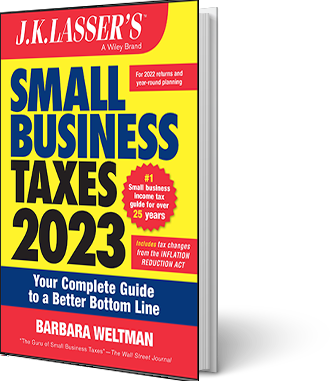 For more than 25 years, I’m proud to say my tax book for small businesses has been the go-to guide for owners and their tax advisers. The 2023 edition for preparing 2022 returns as well as tax planning for 2022 has been updated to incorporate changes from the Inflation Reduction Act as well as other new laws, court decisions, and IRS pronouncements. As has been my practice, I’ve written my own book review to explain the purpose of the book, what’s new, and what’s ahead. (The following is an update to previous blogs about my book.)
For more than 25 years, I’m proud to say my tax book for small businesses has been the go-to guide for owners and their tax advisers. The 2023 edition for preparing 2022 returns as well as tax planning for 2022 has been updated to incorporate changes from the Inflation Reduction Act as well as other new laws, court decisions, and IRS pronouncements. As has been my practice, I’ve written my own book review to explain the purpose of the book, what’s new, and what’s ahead. (The following is an update to previous blogs about my book.)
Why small business owners need a tax book
If you’re like the vast majority of small business owners (about 90%), you use a CPA or other tax pro to prepare your business returns. You may even work with tax experts on specific matters, such as inventory management, payroll, and succession planning. That’s great, but for small businesses, continually asking for advice on every matter that comes up can be too pricey.
It’s my belief that whether you’re just starting out or have been running your business for a long time, all small business owners need to be informed about taxes and can’t rely solely on tax professionals. The reason: owners, not their accountants or software, run their businesses and make decisions impacted by taxes on a daily basis.
- What are the tax differences for entity types (e.g., S corporation versus LLC)?
- Should you hire employees or engage independent contractors?
- Should you buy or lease equipment?
- Should you go green, which may entitle you to special tax deductions or credits?
- What type of financing should be used to start or grow a business?
- Who should own the truck—the owner or the company?
- What are the consequences of offering your employees a particular type of health care arrangement, or opting not to offer any medical coverage?
- What are the tax implications of various employee benefit plans and how do you offer them without messing up and incurring penalties?
- What are the tax and practical implications of operating a business from home?
- What happens if you operate in more than one state?
You may get information from your tax pro that’s helpful to your business. But you can also educate yourself by reading my book—without incurring professional fees. At a minimum, you’ll be able to ask your CPA or other tax adviser the right questions to protect your business and cut your tax bill.
Why tax professionals need this book
As a tax pro, I’m assuming you are aware of tax rules impacting clients that are small businesses and their owners. The book goes beyond tax rules to provide a holistic approach to various matters that will help tax advisers provide the best guidance for clients. For example, it’s one thing to understand the tax implications of debt versus equity financing. It’s another to appreciate the practical implications of these choices of which clients should be made aware.
What the book includes
In addition to reflecting all cost-of-living adjustments to various limitations and eligibility requirements for tax breaks, the 2023 edition covers the tax changes from the from the Inflation Reduction Act of 2022 that impact 2022 returns, as well as changes from pre-2022 legislation that became effective in 2022. It also includes “looking ahead” boxes throughout the book to alert you to rule changes effective starting in 2023 so you can plan ahead.
The book primarily focuses on federal income taxes, but includes information on federal employment and excise taxes, as well as some state and local tax matters. It lists information returns that businesses may be required to file, plus when and where to do it. And it discusses how to deal with the tax professionals and the IRS.
What’s to come
The tax law doesn’t stand still. There are always new laws, cases, and rulings that arise after the publication of the book. To update readers, there’s an online supplement to explain last-minute developments, including any new IRS guidance and court decisions that could impact 2022 returns and tax planning for 2023 and beyond. The supplement is free and should be posted early February 2023 on my website as well as on JKLasser.com.
The supplement will include changes from a final tax measure expected to be enacted in December of this year as part of a final funding measure for the government’s 2023 fiscal year (a continuing resolution extended funding through December 16, 2022, so legislation should be completed by this date).
This measure may include some retroactive extensions for rules that expired at the end of 2021. It may also contain rules that may impact compensation packages, incentives for taking certain business actions, and strategic planning for businesses. The supplement will provide cost-of-living adjustments to various provisions for 2023 to help with estimated taxes for that year, the first payment of which for individuals as well as calendar-year C corporations, is April 18, 2023.
Interacting with readers
Each year I receive emails from readers asking questions, suggesting future topics to include, and sometimes pointing out errors. I’m very grateful for these communications, which helps me continually improve the book and provide valuable assistance to small business owners. If you have thoughts on the book, please email me at Barbara @ BigIdeasForSmallBusiness [dot] com.


